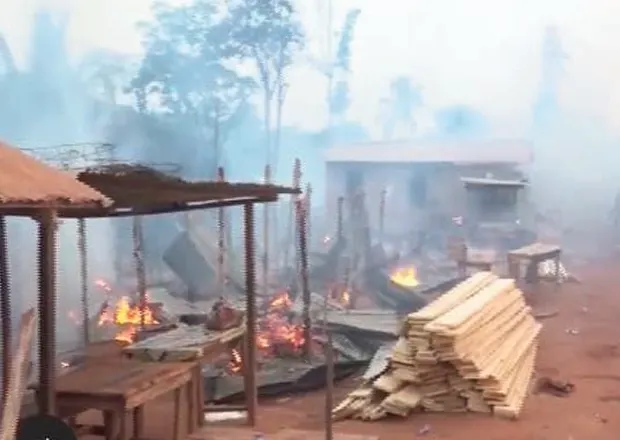The Subri Forest Reserve, a vital ecological asset in Ghana, had become unknowingly besieged by a sprawling illegal settlement, harboring a population far exceeding initial estimates. This clandestine community, Abrewa Nni Nkran, had evolved from a small mining outpost into a lawless enclave of over 10,000 individuals, including a significant number of foreign nationals from various West African countries. The settlement, a stark contrast to the surrounding protected forest, functioned outside the reach of state authority, fostering an environment conducive to illegal mining and a range of criminal activities. Its clandestine nature allowed it to flourish undetected, masking the true scale of its operations and the extent of its environmental and social impact on the surrounding area. The discovery of this hidden community underlines the complex challenges facing Ghana in its fight against illegal mining and its associated criminal networks.
A joint operation spearheaded by the Ghana Armed Forces and the Forestry Commission brought Abrewa Nni Nkran into the stark light of law enforcement. The operation, a targeted dawn raid, aimed to dismantle the illegal settlement and disrupt the criminal activities festering within. Initial intelligence suggested a population of around 2,000 illegal miners. However, the reality on the ground was far more alarming. The security forces encountered a significantly larger, unregulated settlement, a testament to the scale and sophistication of the illegal operations. The diversity of nationalities within the settlement – Nigerians, Guineans, Nigeriens, Burkinabes, and Malians – transformed it into a microcosm of West Africa, a “mini-ECOWAS zone” as described by locals. This influx of foreign nationals not only exacerbated the illegal mining activities but also introduced a complex web of transnational criminal networks, further complicating the situation.
The operation focused on dismantling the physical infrastructure supporting the illegal activities. Numerous makeshift structures, including those used for mining and as brothels, were destroyed. This targeted demolition aimed to disrupt the logistical and operational backbone of the illegal settlement, rendering it less conducive to criminal activities. The discovery of brothels within the settlement highlighted the extent of the social degradation and exploitation occurring within this hidden community, further underscoring the urgency and importance of the intervention. The operation not only addressed the environmental damage caused by illegal mining but also aimed to protect vulnerable individuals from exploitation and human trafficking networks operating within the settlement.
The reaction from the legitimate residents of the surrounding areas was one of palpable relief. The illegal settlement had cast a long shadow over their lives, fostering fear and insecurity. They described Abrewa Nni Nkran as a hotbed of illicit activities, including child prostitution, drug trafficking, counterfeiting, and human smuggling – crimes that eroded the social fabric and threatened the safety and well-being of their communities. The residents’ positive response to the intervention underscores the significant negative impact the illegal settlement had on the surrounding areas and reinforces the legitimacy of the government’s efforts to combat illegal mining and related criminal enterprises.
Authorities revealed the extent of the foreign nationals’ involvement, extending beyond illegal mining to encompass the establishment of sophisticated criminal networks and dens. These networks, operating within the shielded environment of the illegal settlement, posed a significant threat to national security and environmental sustainability. Their transnational reach and interconnected operations highlighted the complex and multifaceted challenge posed by illegal mining, extending beyond purely environmental concerns to encompass broader security and societal implications. The presence of these criminal networks underscored the need for a sustained and comprehensive approach to address the root causes and consequences of illegal mining.
The operation to dismantle Abrewa Nni Nkran represents a crucial step in Ghana’s intensified national crackdown on illegal mining, particularly within ecologically sensitive areas like the Subri Forest Reserve. The government’s commitment to addressing this complex issue is evident in the coordinated efforts of the Ghana Armed Forces and the Forestry Commission. The discovery of this large-scale illegal settlement highlights the need for continued vigilance and proactive measures to prevent similar situations from arising in the future. The dismantling of Abrewa Nni Nkran is not just a symbolic victory; it’s a tangible step towards restoring order, protecting vulnerable populations, and safeguarding Ghana’s precious natural resources. Further investigations are underway, indicating a commitment to pursuing those responsible and preventing further environmental degradation. The operation serves as a strong deterrent and a clear message that illegal mining and its associated criminal activities will not be tolerated.














